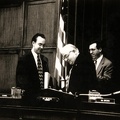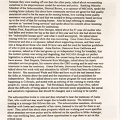[Headline] Hearing on Community-Based Care for Americans with Disabilities
The hearings held yesterday by the Health and the Environment Subcommittee of the Commerce Committee were called the Hearing on Community-Based Care for Americans with Disabilities. They went well and it was very obvious everyone has been working very hard to prepare for them. The support from all of the MiCASA supporter groups and several others including National Council on Disabilities, the ARC, NCIL, TASH and many of the local groups including the DC Center for Independent Living was phenomenal and really helped make the day!
Over 300 people showed up to support MiCASA, so that they had to have an overflow room on the third floor into which the proceedings were televised.
C-SPAN, despite everyone's VERY hard efforts, which are deeply appreciated, and despite efforts by the committee, did not cover the hearings. However, we are trying to get a copy of the video tape and if we are successful you can get copies through Denver 303/333-6698 or e-mail national@adaptorg.
Speaker Newt Gingrich and House Minority Leader Dick Gephardt testified first, talking about the importance of the legislation, and the need to empower people with disabilities. Gingrich talked about the waste of lives that was the result of the current system, and said that in light of the testimony that was to come later from some states that have successful programs, the CBO's "scoring theories" might be a bit off. Gephardt talked about the many fine institutions that must be protected, but also said there is clearly an institutional bias in Medicaid and that people have a right to live in the community. Gingrich talked about the quadriplegic US Attorney Holly Caudell with whom he and many other Congressional leaders as well as the President had met and who might have to not go to work because she could not afford her attendant services. Gephardt talked about his friend Max Starkloff, also a quad and Dir. of the CIL in St. Louis, who had done so much to educate him about disability issues, including attendant care. Both leaders were very positive on the bill, though oddly both spoke quite a bit about cure researchl?!
The Subcommittee members then made opening comments talking in support of the bill generally, though raising two familiar issues of safety and cost several tunes. Rep. John Dingell, Democrat from Michigan, spoke about how great the words here today were, but that the leadership's budget work has not reflected these priorities. Another member, whose name I could not catch -- but was most likely a Republican because they were trading off one then the other party, talked about recommitting ourselves to the empowerment model for services and policy. Ranking Minority Member of the Subcommittee, Sherrod Brown, a co-sponsor of MiCASA, spoke the nursing home industry line about how community services are great but that quality assurances need to be the same as for nursing homes, how nursing home quality assurance was pretty good and that we needed to bring community based services up to the level of that for nursing homes. Also he kept referring to attendant services as "assisted living services" and spoke about his concern about lessening quality with fewer resources for institutions.
Nathan Deal, Republican from Georgia, talked about his 91 year old mother who had fallen and broken her hip at the start of this year and how she had shown him the "indomitable human spirit" and what it could accomplish. He talked about staying with her overnight while she was recovering. Gene Green from Houston, Democrat and also a co-sponsor, talked about supporting choices, and then went into a thing about those who need 24 hour care and the need for baseline guidelines of who to pick as an attendant. Anna Eschoo, Democrat from California and co-sponsor, talked as if she had grown up on independent living for breakfast, that the current system was wrong and degrading, that MiCASA though not perfect legislation is attacking a critical problem, her caveat being that some still would not have access. Bart Stupack, Democrat from Michigan, talked about his state's attendant service program, his concern about the CBO scoring and he said was very interested to hear the testimony Diana DeGette, Democrat from Denver Colorado, talked about her work with and education by ADAPT which had been founded in her district. She mentioned Wade and Mike and how much she had learned from the folks at Atlantis about the need and the importance of and possibilities for independence. She also talked about a new waiver program for rural services now happening in Colorado, and ended with an echoing of the warning to watch what people do, versus what they say. Ted Strickland, Republican from Ohio, talked about the difficulty of being asked to choose between needy populations, the unreal and unrealistic regulations that should be changed, and a warning to be careful.
The subcommittee broke to vote and then returned to hear the testimony of Justin Dart, who could not stay much longer due to health reasons. His testimony is coming in a message that follows this one. The subcommittee members, obviously familiar with Justin and respectful of his views, listened to his call for them to act now! They asked him about state programs which are working and more specifics about attendant services policy and he deferred on the specifics to Mike Aubcrger, who was testifying later, and used these opportunities to urge them to act on this critical issue.
After another break for another vote, the subcommittee heard from the Administration, in the persons of Sally Richardson, head of Medicaid, and Dr. Margaret Hamburg, Assistant Secretary for Planning and Education at Health and Human Services. This was perhaps the weakest piece in the hearing. They talked about their initiatives and programs related to community care, and some of the changes they had made. Richardson stated that there was an institutional bias in long term care. They spoke very favorably about community based services, and said they et of the costs of the benefits.
There was another break and then the third and final panel spoke in this other: Polly Spare, President of Voice of the Retarded; Victoria Brown, President of National Organization of the Disabled (NAOTD); Carol Hughes, Chair of Gthgrich's district Disability Task Force; Ann Koci, Commissioner of Adult Medical Services Kansas Dept of Social and Rehabilitation Services; Jim Rydingsword, Director of Senior Services Oregon Cascades of West Council of Governments; and Mile Auberger, ADAPT National Organizer and Chair of TASK
After a warm introduction by her Congressman Greenwood, Polly Spare read her testimony, which was full of statistics and citings of studies, at a rapid fire pace, but was unable to get through it before the Chairman cut her off at the five minute bell. It was very difficult to retain what she said, although it was full of the usual fear mongering of closing institutions and dumping people, morbidity statistics and references to the infantality of people with mental retardation. She said that ADAPT did not include people with cognitive disabilities and that MiCASA overlooked their needs. No one asked her any questions.
Carol Hughes, in addition to her official role is the mother of a young man, early 20s, who has a developmental disability. She spoke positively and straightforwardly about the bias in the current system, the need to promote independence and inclusion, how attendant services and technology could promote these ends. She was upbeat, insightful and spoke to how MiCASA would make significant improvement. She had to leave, she thought, to catch a plane. Later though she reappeared saying she had made a friend who was going to drive her to the airport (and the woman who was going to do this stood up in the audience and called out "Mothers for MiCASAi")
Next came Victoria Brown who was clearly nervous and hard to hear. When the Chair tried to get her to use the mike better she seemed to become more intimidated and her voice became more quivery. She announced that NAOTD, VOR and the American Health Care Association (AHCA the nursing home lobby group) had formed an alliance and were offering an alternative proposal to MiCASA, a "consensus document". She said NAOTD supported community based services but that MiCASA needed many improvements including: restrictive coverage and eligibility, vague principles and definitions in the bill and restrictive services provided. By this last, she went to say she meant it did not provide for housing, transportation, employment and more, all of which were terrible problems for persons with disabilities. She seemed to want MiCASA to cover all these areas as well. She also spoke quite a bit about protections and seemed to be saying people should not be let out of institutions until all these issues were addressed.
Next came Ann Koci the Medicaid director from Kansas. She talked about their 14 year old waiver programs which are similar to MiCASA in that they allow institutional eligible individuals to choose community services instead. Unfortunately, she spent a good deal of her 5 minutes on how their waiver was designed and created by consensus, but she did talk briefly about the fact that most people were choosing community services and were very satisfied, and about how the state was saving money. The Chair had her summarize and there were no questions from the members.
Jim Rydingsword of Oregon gave excellent testimony, outlining how over time more and more people where choosing community care, how they were extremely satisfied, how the woodwork effect had NOT been a problem and how community services were not more expensive. He was asked several questions and his answers underlined his initial remarks.
Mike Auberger testified last. His testimony will follow. Basically he highlighted what the bill did, talked about the institutional bias, problems with fragmentation of long term care and the overly medical model. At the end he called for the Committee to hold field hearings on the issue during the next 6 months. The Chair of the Committee seemed to be moved to tears by the picture of the effect the current system has on people with disabilities, and although he looked interested in the hearings ideas he talked about their limited budget. Clearly this will need to be pushed. Auberger got many questions about the specifics of his experiences and the delivery of services, and would have gotten more except that there are time limits that each member has on questions and follow up comment. The other problem was that many of the subcommittee members did not stay for the whole hearing. They did say, however, that they wanted to mail written questions to the panel members for more information.
We now need to push for more co-sponsors and for the field hearings. The ball is definitely in motion, and will be moved along with education on the issue (which I think members will now be more open to) and pushing by us for them to act! More on this soon.
When Auberger turned in his testimony he also turned in a stack of the written testimony many of you were dedicated enough to submit. Remember, those of you who have not yet had time can still submit written testimony until the 18th (Weds.) All of this will be included in the record of the hearing.
- Created on
- Tuesday 16 July 2013
- Posted on
- Friday 8 November 2019
- Albums
- Visits
- 268
- Rating score
- no rate
- Rate this photo


0 comments